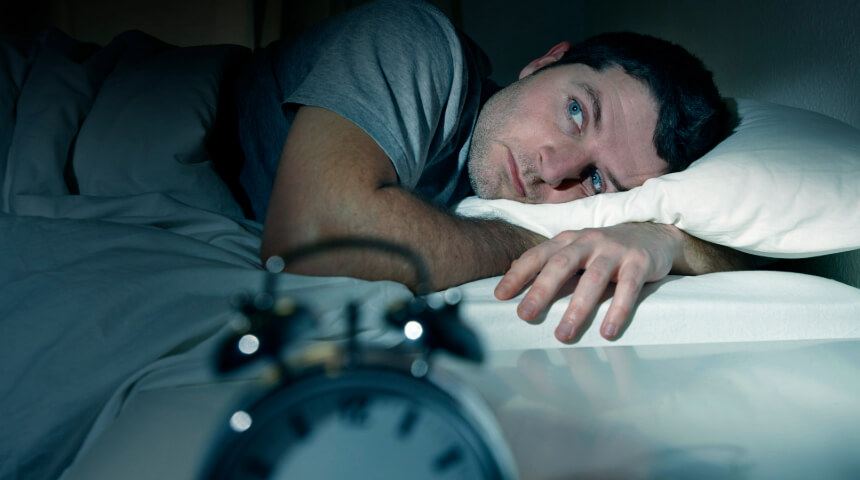If you struggle to fall asleep – or stay asleep – you’re not alone. Almost a third of adults suffer from insomnia at some point in their lives. This can show up among teens, who naturally stay up later and often have irregular sleep patterns, or it can happen later in life, whether because of a stressful event or simply as the result of aging.
It’s important to understand that insomnia is a clinical diagnosis, treatable with a doctor’s care. Here’s what you need to know about insomnia and whether it’s time to seek help.
Symptoms of Insomnia
Insomnia can affect your nights in three ways. Whether you struggle to fall asleep, wake up in the middle of the night once or multiple times, or wake up at night and struggle to fall back asleep, you may have insomnia.
Insomnia can also affect afternoon energy levels. Without proper rest, you won’t feel rested in the afternoon. If you’re regularly fighting daytime tiredness, you may have insomnia.
Insomnia can also show up as:
- Increased anger
- Anxiety
- Depression
- Difficulty focusing or remembering
- Increased frequency of accidents at work
2 Types of Insomnia
Acute insomnia. One kind of insomnia is acute, also known as transitional insomnia. This kind is temporary, often due to a stressful or other highly emotional event. For example, college students preparing for a big exam may face acute insomnia. Financial stress may also bring on sleepless nights. Once the trigger is removed, so, too, is the insomnia.
Chronic insomnia. The other kind is chronic insomnia, not caused by any event, but persisting until treated. Within chronic insomnia are two varieties: primary insomnia and secondary insomnia.
Primary insomnia simply arises on its own. In the case of idiopathic primary insomnia, this condition just appears, not due to stress. If stress is the cause, you’re said to have stress-related primary insomnia.
Secondary insomnia can be caused by another medical condition. When you learn you have a medical condition, the focus is on treating that diagnosis. Treating your lack of sleep may become secondary — if you’re even aware of the issue at all. However, it’s worth acknowledging any shift in sleep habits and talking to your doctor about possible solutions.
Conditions That Can Cause Insomnia
There are many health conditions that can bring on sleepness nights, including:
Cancer. Cancer can certainly cause physical pain, but just as common is emotional stress. Worry, dread and fear often last through the night. People know that having cancer is stressful, but they don’t always consider the ways it affects sleep.
Alzheimer’s or Parkinson’s. People living with these diagnoses often have disrupted sleep cycles. They tend to sleep during the day and are awake at night. In this case, sadly, there’s not much that can be done to restore regular sleep habits.
Lung Conditions. Certain lung conditions can cause sleep-related breathing disorders or even cause someone to stop breathing at night.
Chronic Pain and Arthritis. Contending with daily pain also tends to cause insomnia. When you have bodily pain, you can't get comfortable in bed. To control the pain, people tend to constantly turn to medication, but that requires waking to take the medicine.
Restless Legs Syndrome. This condition causes an uncontrollable urge to move your legs, and this urge doesn’t let up at night, leading to difficulties sleeping.
Menopause. If you’re postmenopausal and your hormones have already undergone a shift, you’re likely experiencing night sweats and hot flashes, negatively affecting your sleep. For many women, another big aspect is stress. It can be a struggle to navigate the mood swings and effects on cognition. Menopause is commonly a time that leaves women feeling anxious, disoriented and stressed — and largely without sleep.
Pregnancy. Just as impactful as menopause, pregnancy also brings significant hormonal changes, which can also wreak havoc on sleep patterns.
Aging. As you age, you’re more likely to experience insomnia as aging naturally changes your sleep pattern. This is part of the reason that older people tend to go to bed early to offset sleeplessness and still get the same number of hours of rest. As we age, we tend to tire more easily. We are also less likely to fill the days with physical or social activity, and that lack of activity means we’re not as ready for rest come bedtime. At any age, we need to be fatigued in order to sleep.
For older adults, naps can be detrimental. A 15- to 20-minute nap is fine, but sleeping three to four hours in the afternoon is not recommended.
If you suspect one of these reasons is the culprit behind your insomnia, it could be time to talk to a doctor. Your doctor will be able to conduct a thorough assessment to determine the causes behind your insomnia as well as guide you through options to restore healthy sleep patterns.
Choose to Stay in Touch
Sign up to receive the latest health news and trends, wellness & prevention tips, and much more from Orlando Health.
Sign Up










